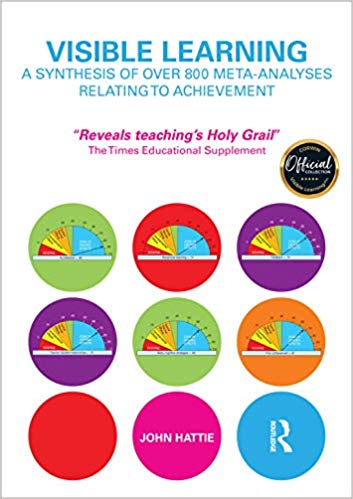Here’s my newest teaching mantra: Talk learning, not logistics.
That means when you’re talking with students, don’t talk just about what questions they need to do, how much time they have, or how they need to quit watching car videos on their computer. Sure, you need to tell them that too sometimes. But try to minimize it. Instead, try to talk to students about more important stuff — what they’re learning, what they’re not learning, what sense they’re making of the material, what information they need to move forward.
Talk learning, not logistics.
It’s a saying I learned last year during my fellowship when I spent a solid month digesting John Hattie’s profound teaching book, Visible Learning. I can’t remember if it was Hattie or one of the researchers he cites. I think it might have been his countryman Graham Nuthall who wrote about this. But someone influential had found that most teachers talk to students primarily about task regulation, not about learning. When I thought about it, I realized that I do the same thing. You pop by during project time and you check on kids: “Where are you? Which number question are you on? Remember, you only have 15 minutes. When you’re done, start on the homework. Don’t talk to your neighbor. Don’t talk to her on Snapchat, either.”

During class, when you’re presenting at the front of the room, it’s the same thing. It’s, “Here’s the homework, here’s the upcoming schedule, let me take you through the directions, here’s what you should and should not do, here’s what page you need to be on, here’s what to do first, for Thursday, and how deeply to answer.”
When I stopped and thought about it, I realized that I talked with my students almost exclusively about . . . logistics.
That’s a problem, you realize, because it means that you haven’t been talking to students about what really matters: What they are or aren’t learning. And that’s wrong.
The question, of course, is how to do that. That can be surprisingly hard to answer. It means that you must be discussing with students what they are supposed to be learning, and receiving feedback from them on what they are learning — constantly.
The other day was a perfect example of a moment when I tried to live by this mantra. Without boring you with the details, during writing units, I put students into peer writing groups to practice giving and receiving feedback on each other’s drafts. It’s a great way for students to get suggestions. That said, as is the case with any relatively intricate classroom activity, the temptation is to spend the whole time training kids in the logistics, not in the underlying learning that the activity is supposed to facilitate.
Instead, I tried to break that pattern. I tried to ask myself, “What is it that I want students to get out of this activity, learning-wise?” Here, I will say, the advent of proficiency based learning in Vermont has really helped me — and my guess is, a whole generation of Vermont educators — to parse our learning goals. I came up with: I want students to learn how to give useful feedback to their peers.
So I began by asking the students — what makes useful feedback? I centered it around two specific procedures that I often call for in writing groups: writers reading their work aloud (as opposed to the group simply reading silently on their own), and group members having an out-loud conversation about the work (as opposed to commenters simply putting online comments on the draft without real discussion). We talked about what has worked in the past and what hasn’t.
Then, during the unit, when I checked in with students, I kept it centered on this specific learning goal. How are you doing with this, I’d ask? What’s working and what’s not? At the end of the lesson, we did a debrief on how it all went, and strategized about how to do writing groups better in the future, again centered specifically around the goals of reading aloud and of having out-loud conversations.
I’m starting to feel like I’m digging into discussions of learning rather than simply discussions about logistics. And that strikes me as tremendously important.
